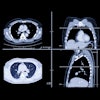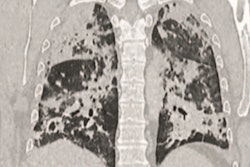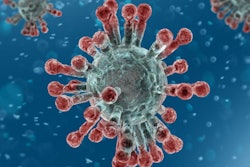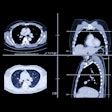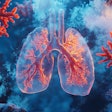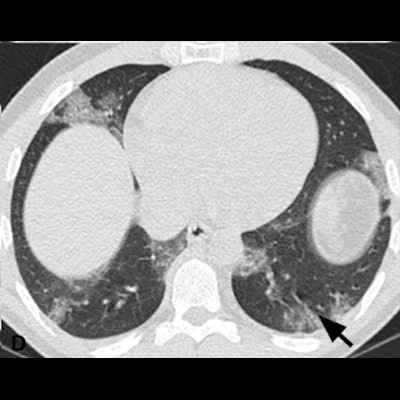
Chest CT severity scores can help radiologists evaluate the extent of COVID-19 and better triage patients, according to a study published March 30 in Radiology: Cardiothoracic Imaging by a group of researchers from China.
The researchers found an optimal "inflammation load score threshold" that identifies patients with severe disease.
"Quantitative and semi-quantitative indicators [such as CT scoring] to evaluate the severity of lung inflammation in COVID-19 could provide an objective approach to rapidly identify patients in need of hospital admission," wrote a team co-led by Dr. Ran Yang and Dr. Xiang Li of Chongqing University Three Gorges Hospital in China.
Although reverse transcription polymerase chain reaction (RT-PCR) assay is considered the most effective way to diagnose the presence of the SARS-CoV-2 virus that causes COVID-19, chest CT is a useful tool for assessing the extent of the disease, according to Yang and colleagues.
But identifying quantitative features on CT imaging to evaluate disease severity could help even more.
"We hypothesize that CT could be used to provide objective assessment about the extension of the lung opacities, which could be used as an imaging surrogate for disease burden," the group wrote.
The investigators conducted a study that included 102 patients with COVID-19 pneumonia confirmed by RT-PCR testing who also underwent chest CT. They developed a chest CT severity score that summed up individual opacification scores from 20 areas of the lungs (opacity was evaluated on a range of 0 to 2) for a total severity scoring range of 0 to 40. Of all the cases, 84 were mild and 18 were severe.
The team found that individual chest CT severity scores in each lung, as well as total scores, were higher in acute cases of COVID-19 compared with mild cases. The optimal CT severity score threshold for identifying critical COVID-19 was 19.5 (area under the receiver operating curve, 0.892), with 83.3% sensitivity and 94% specificity.
| Chest CT severity scoring, left and right lungs | |||
| Lung area | Mild cases (84) | Severe cases (18) | P-value |
| Left lung | 6 | 12 | <0.001 |
| Right lung | 6 | 12 | <0.001 |
| Total score | 13 | 23.5 | <0.001 |
Fifteen patients in the group with severe disease had scores equal to or greater than 19.5, compared with five in the mild group. Three patients with severe disease had a score less than 19.5, compared with 79 in the mild group. These findings translated to a positive predictive value for disease severity of 75% and a negative predictive value of 96.3%.
The study offers clinicians an effective way to assess the extent of COVID-19, according to the researchers.
"We envision that this relatively straightforward method could provide objective means to expedite the identification of patients with severe disease, especially in situations of limited availability of healthcare resources," the group concluded.





